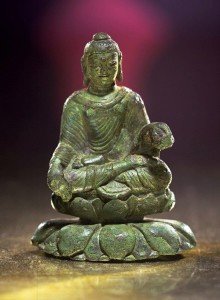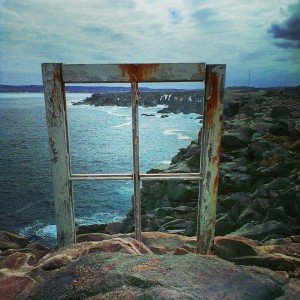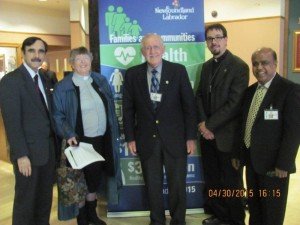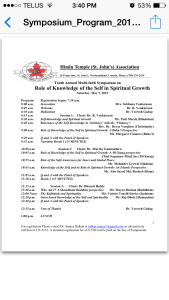 In some of my spare time I enjoy reading about archaeology. I find it fascinating to learn of the various ways that humans in earlier times moved and lived within their own contexts. In the course of this small hobby, this past few weeks I have read about the discovery of the Treasures of Helgo . I was amazed to learn of a find on that island, of a 6th Century Buddha statue, an 8th Century Irish Crozier, and a Coptic Ladle from North Africa. For a long time I have recognized that humans have traveled further than once thought in the ancient world, yet I still found it quite enlightening to think of Vikings coming into contact with African Copts, Indian Buddhists, and Irish Christians.
In some of my spare time I enjoy reading about archaeology. I find it fascinating to learn of the various ways that humans in earlier times moved and lived within their own contexts. In the course of this small hobby, this past few weeks I have read about the discovery of the Treasures of Helgo . I was amazed to learn of a find on that island, of a 6th Century Buddha statue, an 8th Century Irish Crozier, and a Coptic Ladle from North Africa. For a long time I have recognized that humans have traveled further than once thought in the ancient world, yet I still found it quite enlightening to think of Vikings coming into contact with African Copts, Indian Buddhists, and Irish Christians.
 I guess from my perspective, I have a somewhat limited frame of reference, which is mostly in the present, planning for the future, and most often in the context of Christianity, modern Canadian, and Newfoundland culture. Nevertheless, this learning has once again broken open my understandings of the frames of reference of the ancient Viking. Vikings must have come into contact, through trade, perhaps through war and conflict, other cultures and peoples. How they must have been transformed by these encounters!
I guess from my perspective, I have a somewhat limited frame of reference, which is mostly in the present, planning for the future, and most often in the context of Christianity, modern Canadian, and Newfoundland culture. Nevertheless, this learning has once again broken open my understandings of the frames of reference of the ancient Viking. Vikings must have come into contact, through trade, perhaps through war and conflict, other cultures and peoples. How they must have been transformed by these encounters!
In my ignorance, I tend to think and believe that many persons are shaped and influenced by a rather small frame of reference. The decisions we make and the actions we pursue are shaped by our own circle of knowledge and experience. We relate to our own; we operate in spheres and systems that are comfortable, predictable, and successful as human beings.
I am constantly reminded that the experiences of human beings are universal; the frame of reference may be narrow. As human beings we are born, we live, we experience joy and pain, hardship and plenty, we die. No matter if we are ancient: Vikings, Indian Buddhists, Irish Christians or African Copts, or if we are modern: the cycles of human experience have intersecting commonalities.
 I hold this belief then, due to a portion of my ministry and experience, that gives me the privilege of working with persons of differing cultures, nationalities, and religions. In my role I have the privilege of sharing and listening with persons of all the major world religions on a monthly basis. In this context, strong friendships have formed, as we continue to work together in some small way, for others in this community.
I hold this belief then, due to a portion of my ministry and experience, that gives me the privilege of working with persons of differing cultures, nationalities, and religions. In my role I have the privilege of sharing and listening with persons of all the major world religions on a monthly basis. In this context, strong friendships have formed, as we continue to work together in some small way, for others in this community.
This, combined with my parish pastoral role, has offered me fresh insight in how others live, grow, cope, and change in the context of human community.
I have listened to one friend describe her struggle with coming to grips with her faith in the wake of the death of her teenage son, over forty years ago. It seems so similar to the grief and pain I witness in listening to another friend tell of his daughter’s struggles from birth with hospitalization, illness, surgery, and recovery. These people share basic human concerns, hurts, and pain, even though their religion – their faith operating system, is vastly different.
If I shut out the opportunity to interact with someone of another religion, I would not experience the privilege of seeing how God dwells within others as much as with those that are Christian. I am shaped by C.S. Lewis’ Narnian Chronicles, specifically The Last Battle in this regard. The conversation between Emeth and Aslan to me points to a deeper reality.
I believe that as a Christian I am called to interact and work with other faiths to bring about change and development in the lives of others in the world. I do not believe I am called to abandon my spiritual expression; nor am I called to destroy others’.
 So this past week I attended the local Multi-Faith Symposium held at the Hindu Temple, St. John’s. I listened intently to persons of differing faiths present and discuss their understandings of the role of knowledge of self in spiritual growth.
So this past week I attended the local Multi-Faith Symposium held at the Hindu Temple, St. John’s. I listened intently to persons of differing faiths present and discuss their understandings of the role of knowledge of self in spiritual growth.
This past week I continued with a ministry project around the creation of a regional Furniture Bank for the North East Avalon. At the meeting I was asked whether persons needed to be Anglican to continue to endeavour to be a part of this vital project. I told them they did not have to be baptized to be apart of helping others. For me, others may come alongside me in this work. They do not have to be Anglican, they do not have to be Christian.
I believe that God, present in this world, informs many human beings in diverse ways. I do not hold on to notions that God only speaks through the Christian voice. I give thanks for the myriad operating systems and spheres in which people operate, that gives life to the reality that the divine is present and active in this world which we inhabit.

By Tony Houghton May 12, 2015 - 6:18 pm
Jesus is the ONLY way to God or the bible is lying to us ,we must choose.
By Tony Houghton May 12, 2015 - 3:42 pm
It seems to me that if one holds to the ideas that you purpose in this article ,it would call into question the validity of the teachings of the bible and Jesus himself. “Whoever has the Son has life; whoever does not have the Son of God does not have life”.”And there is salvation in no one else, for there is no other name under heaven given among men by which we must be saved.”,” Jesus said to him, “I am the way, and the truth, and the life. No one comes to the Father except through me.” It is very clear that Jesus and the writers of the New testament believed and preached that Jesus was the only way to God and without coming to Jesus there was no salvation only judgment “Whoever believes in the Son has eternal life, but whoever rejects the Son will not see life, for God’s wrath remains on them.”
If God works through all religions then he truly speaks with a forked tongue.
By David Burrows May 12, 2015 - 4:05 pm
God didn’t create religions. God created all, seen and unseen; and it was good!
By Tony Houghton May 12, 2015 - 5:46 pm
You are right ,God did not create religion ,according to His word He created one way to Himself and that is through Jesus alone. Since religions and beliefs contradict one another they all can not be true,they could be all false but not true,as Ravi Zacharias stated “To deem all beliefs equally true is sheer nonsense for the simple reason that to deny that statement would also, then, be true. But if the denial of the statement is also true, then all religions are not true.” We must hold to what God has written in his word as true as He declared Jesus being the ONLY way to God. If this is not true then that calls into question every other truth declaration in the bible.
By Laura Marie Piotrowicz May 17, 2015 - 6:48 am
David, this is a lovely sharing. Thank you.
Can you tell me more about the ‘furniture bank’? If I’m understanding correctly, it sounds like a tremendous ministry, perhaps something that could be beneficial elsewhere too.